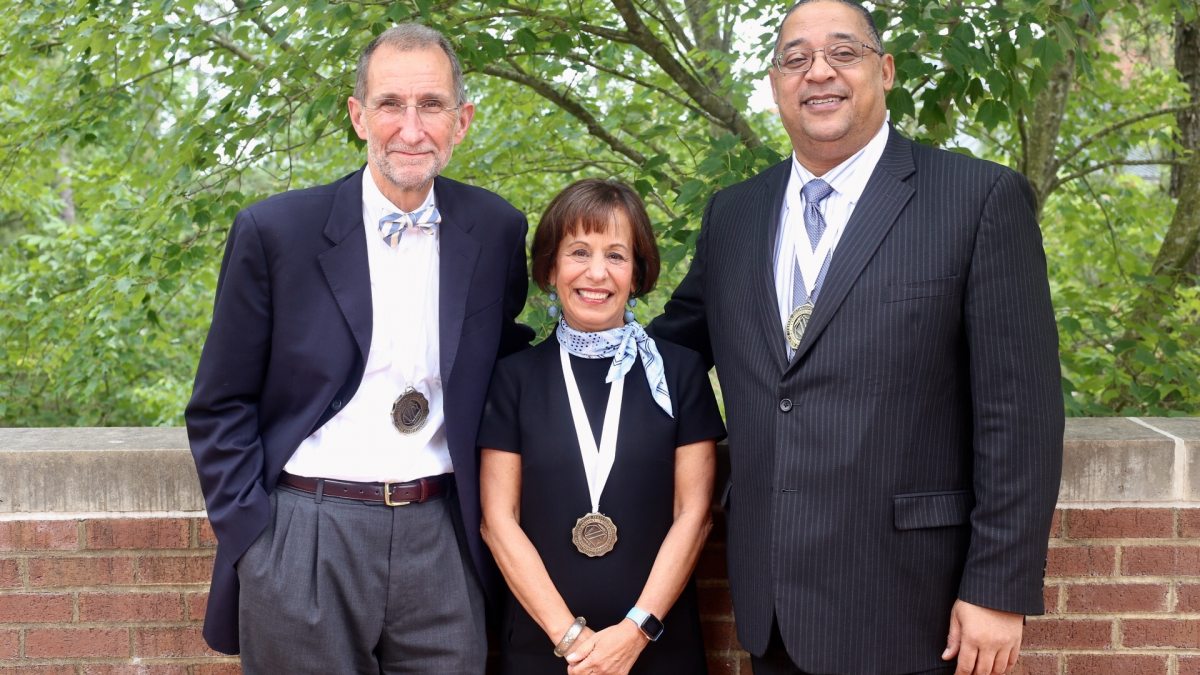GAA honors Folt, Roper and Crisp for service
The General Alumni Association has awarded the medals since 1978 to alumni and others who have provided outstanding service to the association or the University.

The General Alumni Association on Saturday honored a chancellor and the longtime leaders of UNC’s health care system and its student affairs for their service.
The GAA presented its 2019 Distinguished Service Medals to Carol L. Folt, former chancellor; Dr. William L. Roper, former medical school dean and CEO of UNC Health Care; and Winston B. Crisp, former vice chancellor for student affairs.
The medals were presented at the GAA’s Annual Alumni Luncheon during spring reunions weekend. The association has awarded the medals since 1978 to alumni and others who have provided outstanding service to the association or the University.
Folt became Carolina’s 11th chancellor in July 2013, the first woman to hold the post, and she served until resigning in January.
Folt’s signature efforts focused on scholarships aimed at sustaining and expanding access to higher education, such as the Carolina Edge, her initiative to raise $1 billion for scholarships at the undergraduate, graduate and professional school level. She solicited about $15 million for the Chancellor’s Science Scholars program for low-income doctoral students. To help middle-class students, she embraced Blue Sky Scholars and the Red, White and Carolina Blue challenge to raise $20 million for those who come from military families. The $4.25 billion Campaign for Carolina launched in fall 2017, and by the time Folt left office in January, it had raised more than half its goal and was ahead of schedule.
With the Blueprint for Next, Folt created a strategic framework for growth in the coming decade. She also instituted the Three Zeros environmental sustainability initiative, and her commitment to the arts showed in the development of the Arts Everywhere program and in significant donations to the Ackland Art Museum.
Folt inherited at its midpoint a seven-year athletics-academics scandal over fraudulent classes. She saw it resolved in October 2017, when the NCAA’s Committee on Infractions found no violations of its rules and announced that Carolina would not be sanctioned.
She also grappled with controversy over the Confederate monument known as Silent Sam. Protesters pulled it to the ground in August 2018 after Folt had publicly favored removing the statue over safety and security concerns but was stymied by a state law prohibiting its removal. As she resigned, she ordered the remaining pedestal and commemorative plaques removed.
Folt will begin as the next president of the University of Southern California on July 1.
Roper was preparing to step down as dean of the UNC School of Medicine, vice chancellor for medical affairs and CEO of the UNC Health Care System at the end of this academic year but agreed last fall to serve as interim president of the UNC System, which governs the state’s 16 public universities, after then-President Margaret Spellings resigned.
Roper came to Chapel Hill in 1997 as dean of what is now the Gillings School of Global Public Health after a career as a health care executive, director of the Medicare system, a presidential aide on domestic policy and director of the Centers for Disease Control and Prevention. He also has been a professor of health policy and management in the public health school and professor of pediatrics and of social medicine in the medical school.
When Roper left UNC Health Care last fall, the system he had shepherded stretched into a complex of general and specialty hospitals on campus and hospitals from Hendersonville in the west to Goldsboro and Kinston in the east, including Rex in Raleigh. The now-10-year-old N.C. Cancer Hospital was a milestone on the campus —patient services at UNC Lineberger Comprehensive Cancer Center have tripled since it opened. That hospital and Marsico Hall — home to five major medical disciplines once spread across campus — represent significant state investments in Carolina’s medicine facilities during Roper’s tenure. Research funding to Carolina also has increased dramatically in recent years.
Growth Roper set in motion is on track to continue, with a critically needed surgical tower and a new medical school building in the works.
Crisp retired last fall after 26 years of service at Carolina.
After graduating from UNC’s School of Law, he became its first assistant dean for student affairs and the first associate dean for student services. In those positions, he played a key role in strengthening coordination among the academic program, financial management, outreach and student support areas. In recognition of his leadership, the Student Bar Association established the Winston B. Crisp Award in 2005 to recognize students who personify those qualities.
That same year, Crisp became assistant vice chancellor for student affairs and also served as dean of students. He was named a vice chancellor in 2010. He supervised a dozen departments that address student needs, such as Recreation, Career Services, the LGBTQ Center, Disability Services, Campus Y and Carolina Parent programs. He led the effort to convene a mental health task force to assess the scope of mental health care needs for Carolina students and to provide recommendations to the administration and the Board of Trustees on policies and programs related to mental health care.
In the year leading up to his retirement, student affairs conducted more than 1,200 workshops and events, employed nearly 1,500 students and supported approximately 780 student organizations. He also co-chaired the chancellor’s task force on history, which is working on the telling of the full, complete and accurate history of the University.
In 2014, he received the Hortense K. McClinton Outstanding Faculty/Staff Award from the GAA’s Black Alumni Reunion. Earlier this year, the Board of Trustees approved naming the offices of UNC Student Government in the union for him.
Read more at the General Alumni Association website.




